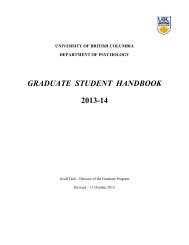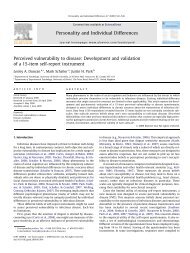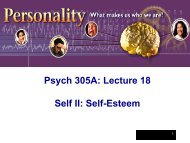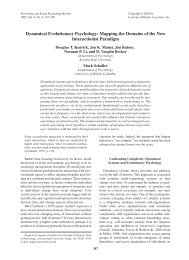Culture and the Self: Implications for Cognition, Emotion, and ... - iacmr
Culture and the Self: Implications for Cognition, Emotion, and ... - iacmr
Culture and the Self: Implications for Cognition, Emotion, and ... - iacmr
You also want an ePaper? Increase the reach of your titles
YUMPU automatically turns print PDFs into web optimized ePapers that Google loves.
228 HAZEL ROSE MARKUS AND SHINOBU KITAYAMA<br />
primarily in accordance with <strong>the</strong> anticipated expectations of<br />
o<strong>the</strong>rs <strong>and</strong> social norms ra<strong>the</strong>r than with internal wishes or<br />
personal attributes (Yang, 198 Ib). A premium is placed on emphasizing<br />
collective welfare <strong>and</strong> on showing a sympa<strong>the</strong>tic concern<br />
<strong>for</strong> o<strong>the</strong>rs. Throughout <strong>the</strong> studies of <strong>the</strong> Chinese reported<br />
by Bond, one can see <strong>the</strong> clear imprint of <strong>the</strong> Confucian emphasis<br />
on interrelatedness <strong>and</strong> kindness. According to Hsu (1985),<br />
<strong>the</strong> supreme Chinese virtue, jen, implies <strong>the</strong> person's capability<br />
to interact with fellow human beings in a sincere, polite, <strong>and</strong><br />
decent fashion (see also Elvin, 1985).<br />
Numerous o<strong>the</strong>r examples of cultures in which people are<br />
likely to have some version of an interdependent self can also be<br />
identified. For example, Tri<strong>and</strong>is, Marin, Lisansky, <strong>and</strong> Betancourt<br />
(1984) have described <strong>the</strong> importance of simpatico<br />
among Hispanics. This quality refers to <strong>the</strong> ability to both respect<br />
<strong>and</strong> share o<strong>the</strong>rs' feelings. In characterizing <strong>the</strong> psychology<br />
of Filipinos, Church (1987) described <strong>the</strong> importance that<br />
people attribute to smooth interpersonal relations <strong>and</strong> to being<br />
"agreeable even under difficult circumstances, sensitive to what<br />
o<strong>the</strong>rs are feeling <strong>and</strong> willing to adjust one's behavior accordingly"<br />
Similarly, Weisz (in press) reported that Thais place a<br />
premium on self-effacement, humility, deference, <strong>and</strong> on trying<br />
to avoid disturbing o<strong>the</strong>rs. Among <strong>the</strong> Japanese, it is similarly<br />
crucial not to disturb <strong>the</strong> wa, or <strong>the</strong> harmonious ebb <strong>and</strong> flow of<br />
interpersonal relations (see also Geertz, 1974, <strong>for</strong> characterizations<br />
of similar imperatives among <strong>the</strong> Balinese <strong>and</strong> Moroccans).<br />
Beattie (1980) claimed that Africans are also extremely sensitive<br />
to <strong>the</strong> interdependencies among people <strong>and</strong> view <strong>the</strong> world<br />
<strong>and</strong> o<strong>the</strong>rs in it as extensions of one ano<strong>the</strong>r. The self is viewed<br />
not as a hedged closure but as an open field. Similarly, Marriott<br />
(1976) argued that Hindu conceptions assume that <strong>the</strong> self is an<br />
open entity that is given shape by <strong>the</strong> social context. In his<br />
insightful book, Kakar (1978) described <strong>the</strong> Hindu's ideal of<br />
interpersonal fusion <strong>and</strong> how it is accompanied by a personal,<br />
cultural sense of hell, which is separation from o<strong>the</strong>rs. In fact,<br />
Miller, Bersoff, <strong>and</strong> Harwood (1990), in a recent, carefully controlled<br />
study on moral reasoning, found that Indians regard<br />
responsiveness to <strong>the</strong> needs of o<strong>the</strong>rs as an objective moral obligation<br />
to a far greater extent than do Americans. Although <strong>the</strong><br />
self-systems of people from <strong>the</strong>se cultures are markedly different<br />
in many o<strong>the</strong>r important respects, <strong>the</strong>y appear to be alike in<br />
<strong>the</strong> greater value (when compared with Americans) that is attached<br />
to proper relations with o<strong>the</strong>rs, <strong>and</strong> in <strong>the</strong> requirement<br />
to flexibly change one's own behavior in accordance with <strong>the</strong><br />
nature of <strong>the</strong> relationship.<br />
Even in American culture, <strong>the</strong>re is a strong <strong>the</strong>me of interdependence<br />
that is reflected in <strong>the</strong> values <strong>and</strong> activities of many of<br />
its subcultures. Religious groups, such as <strong>the</strong> Quakers, explicitly<br />
value <strong>and</strong> promote interdependence, as do many small towns<br />
<strong>and</strong> rural communities (e.g., Bellah, Madsen, Sullivan, Swidler,<br />
& Tipton, 1985). Some notion of a more connected, ensembled,<br />
interdependent self, as opposed to a self-contained, independent<br />
self, is also being developed by several of what Sampson<br />
(1989) calls "postmodern" <strong>the</strong>orists. These <strong>the</strong>orists are questioning<br />
<strong>the</strong> sovereignty of <strong>the</strong> American view of <strong>the</strong> mature<br />
person as autonomous, self-determined, <strong>and</strong> unencumbered.<br />
They argue that psychology is currently dominated by a view of<br />
<strong>the</strong> person that does not adequately reflect <strong>the</strong> extent to which<br />
people everywhere are created by, constrained by, <strong>and</strong> responsive<br />
to <strong>the</strong>ir various interpersonal contexts (see Gergen & Gergen,<br />
1988; Gilligan, 1982; Miller, 1986; Tajfel, 1984).<br />
Fur<strong>the</strong>r definition of <strong>the</strong> interdependent self. Theorists of Japanese<br />
culture are beginning to characterize <strong>the</strong> interdependent<br />
self much more specifically than was previously attempted.<br />
These descriptions offer some more refined ideas of how an<br />
interdependent view of self can depart markedly from an independent<br />
view of self (see Nakane, 1970; Plath, 1980; R. J. Smith,<br />
1983). For example, building on a study of L. T. Doi (1973),<br />
Bachnik (1986) wrote<br />
(in Japanese society) ra<strong>the</strong>r than <strong>the</strong>re being a single social reality,<br />
a number of possible perspectives of both self <strong>and</strong> social life are<br />
acknowledged. Interaction in Japanese society <strong>the</strong>n focuses on <strong>the</strong><br />
definition of <strong>the</strong> appropriate choice, out of all <strong>the</strong> various possibilities.<br />
This means that what one says <strong>and</strong> does will be different in<br />
different situations, depending on how one defines one's particular<br />
perspective versus <strong>the</strong> social o<strong>the</strong>r, (p. 69)<br />
In Japan, <strong>the</strong> word <strong>for</strong> self, jibun, refers to "one's share of <strong>the</strong><br />
shared life space" (Hamaguchi, 1985). The self, Kimura (cited<br />
in Hamaguchi, 1985) claimed, is "nei<strong>the</strong>r a substance nor an<br />
attribute having a constant oneness" (p. 302). According to Hamaguchi<br />
(1985), <strong>for</strong> <strong>the</strong> Japanese, "a sense of identification with<br />
o<strong>the</strong>rs (sometimes including conflict) pre-exists <strong>and</strong> selfness is<br />
confirmed only through interpersonal relationships— <strong>Self</strong>ness<br />
is not a constant like <strong>the</strong> ego but denotes a fluid concept<br />
which changes through time <strong>and</strong> situations according to interpersonal<br />
relationships" (p. 302).<br />
The Japanese anthropologist Lebra (1976) defined <strong>the</strong> essence<br />
of Japanese culture as an "ethos of social relativism." This<br />
translates into a constant concern <strong>for</strong> belongingness, reliance,<br />
dependency, empathy, occupying one's proper place, <strong>and</strong> reciprocity.<br />
She claimed <strong>the</strong> Japanese nightmare is exclusion,<br />
meaning that one is failing at <strong>the</strong> normative goal of connecting<br />
to o<strong>the</strong>rs. This is in sharp contrast to <strong>the</strong> American nightmare,<br />
which is to fail at separating from o<strong>the</strong>rs, as can occur when one<br />
is unduly influenced by o<strong>the</strong>rs, or does not st<strong>and</strong> up <strong>for</strong> what<br />
one believes, or when one goes unnoticed or undistinguished.<br />
An interdependent view of self does not result in a merging of<br />
self <strong>and</strong> o<strong>the</strong>r, nor does it imply that one must always be in <strong>the</strong><br />
company of o<strong>the</strong>rs to function effectively, or that people do not<br />
have a sense of <strong>the</strong>mselves as agents who are <strong>the</strong> origins of <strong>the</strong>ir<br />
own actions. On <strong>the</strong> contrary, it takes a high degree of self-control<br />
<strong>and</strong> agency to effectively adjust oneself to various interpersonal<br />
contingencies. Agentic exercise of control, however, is<br />
directed primarily to <strong>the</strong> inside <strong>and</strong> to those inner attributes,<br />
such as desires, personal goals, <strong>and</strong> private emotions, that can<br />
disturb <strong>the</strong> harmonious equilibrium of interpersonal transaction.<br />
This can be contrasted with <strong>the</strong> Western notion of control,<br />
which primarily implies an assertion of <strong>the</strong> inner attributes <strong>and</strong><br />
a consequent attempt to change <strong>the</strong> outer aspects, such as one's<br />
public behaviors <strong>and</strong> <strong>the</strong> social situation (see also Weisz et al.,<br />
1984).<br />
Given <strong>the</strong> Japanese notion of control that is inwardly directed,<br />
<strong>the</strong> ability to effectively adjust in <strong>the</strong> interpersonal domain<br />
may <strong>for</strong>m an important basis of self-esteem, <strong>and</strong> individualized<br />
styles of such adjustment to social contingencies may<br />
contribute to <strong>the</strong> sense of self-uniqueness. Thus, Hamaguchi







